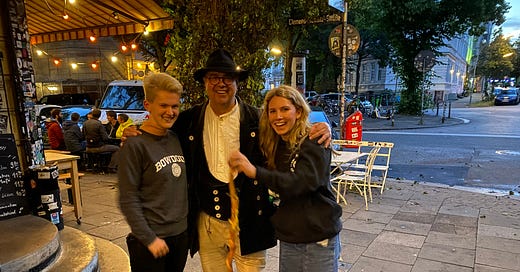The pursuit of happiness 🧚🏻♂️
On being in the right place at the right time, and the science behind how to pursue happiness | Vol. 21
Hello smart and gorgeous person,
Welcome back to Launch Your Twenties! This week, something amazing happened.
A friend and I were lingering at a hole-in-the-wall café, discussing the concept of fate over chips and salsa.
The question was whether A. there’s a divine force that plans every little action down to the last detail or B. if some divine force puts plans into motion but then leaves the rest up to us. Everyone believes something different, of course, but I was starting to lean towards the latter theory. I had felt moments in my life that seemed like pure fate that I was in the right place at the right time, but I also experienced other times when I had to decide between two options that would have very different outcomes. If I had control over the two outcomes, then surely fate isn’t the guiding force I was imagining sweeps us up in its path.
Right as I made my conclusion, something unexpected happened.
As if on cue, a man dressed in traditional German clothing interrupted our conversation.
He recited a poem to the small crowd of customers, announcing that he was a traveling craftsman, part of a 900-year-old tradition. He had come to Hamburg to study stonemasonry and was searching for an apprenticeship. While searching, it was customary to rely on the donations of the local people until he found his mentor. He walked from table to table, collecting small donations from the restaurant patrons.
I excitedly met my friends’ eyes, who also looked as pleasantly surprised as I was.
When the man approached our table, we couldn’t contain our intrigue.
We peppered him with questions and learned all about the tradition called the Wanderjahre (wandering years). He kindly answered all our questions and even agreed to take a photograph with us. It was an incredible opportunity to learn about a cultural tradition that most German learners would only read about in a textbook.
After we said farewell to the Wanderer, I couldn’t help but smile at the fact that I was in the right place at the right time to experience the most German thing imaginable only one week before leaving the country.
It seemed like fate, but it was more than just that.
It was a combination of being in the right time at the right place and creating my own meaning of the situation. The fact is, everyone has their own idea of fate, and everyone creates their own meaning out of their lives. There’s no right or wrong answer, just different theories that will never fail to fascinate.
I’d love to know in the comments, what you believe fate is – and have you had an experience that’s helped you create your belief?
The Big Idea
How do you define happiness and well-being?
This question contains as many unique responses as there are people on Earth (roughly 7.95 billion according to this live population counter).
Naturally, there’s more than one answer. And according to the Journal of Happiness Studies, this is for the better.
A recently published article found that individuals who espouse multiple different definitions of happiness and well-being (HWB) and pursue those goals report higher rates of happiness.
Let’s break down what that means.
In philosophy and psychology, there are countless theories of happiness and well-being. Two prominent theories include eudemonic happiness and hedonic happiness. We’ve seen these theories before in Vol. 16, but essentially eudaimonia is characterized by the pursuit of virtue, self-development, and purpose whereas hedonism is defined by the experience of pleasure.
In essence, the two theories posit that happiness comes from either meaning or pleasure.
While these two concepts of happiness sound very different, this study found they’re both important to our experience of happiness and well-being.
The paper examined how people define and then pursue different definitions of happiness.
Participants in this study first listed their definitions of happiness and well-being. The theories include, among others, the presence of luck in one’s life, a state of calm or tranquility, a feeling of joy or excitement, an absence of negativity, and an overall positive outlook. Researchers categorized these definitions into two large “buckets”: eudemonic or hedonic happiness.
Participants then listed the ways they pursue happiness and well-being in their lives.
The study noted how many unique facets of happiness and well-being participants pursued in their everyday lives, ranging from belonging to a community, having positive relationships, and pursuing a life purpose, to experiencing joy, and more. Researchers defined the pursual of happiness and well-being as intention.
The findings of the study are intriguing.
Researchers found that when people pursued multiple facets of HWB in their lives, they experienced higher rates of subjective and psychological well-being. Rather than pursuing just one area of happiness, such as the hedonic experience of pleasure or the eudaimonic pursuit of life purpose, people are happier when they pursue a diversity of areas. This may be because people do not usually just focus on one aspect of HWB, such as relationships for example, but on many different areas.
In short, pursuing happiness and well-being in a variety of ways is associated with being happier.
The takeaway is that there’s no one correct definition of happiness.
You can pursue happiness by savoring a beautiful sunset. You can pursue happiness by forming close friendships that inspire and support you. You can also pursue happiness by working towards a degree that will lead to your dream job.
Rather than rank these different theories of happiness, you’re allowed to take what you need from each theory.
Pursuing happiness is like making a patchwork quilt. The more varied colors and patterns you add, the more beautiful it becomes.
With this in mind, what inspires you to diversify your pursuit of happiness?

Content Recommendation
I’ll be honest, the punchy title of Kara Loewentheil’s podcast, Unf*ck Your Brain, is what first caught my attention Loewentheil’s work. But the content, discussing how women can change their thoughts to stop imposter syndrome and small thinking, is what got me to stay.
Unf*ck Your Brain explores a way of thinking in which women and other people who have been taught to stay small can start to expand their confidence, voice, and role.
As an intro to the podcast, I recommend starting with episode 242: What is human nature and how do you motivate yourself? In it, Loewentheil asks the question of what our basic view of humanity is. Do you believe that people are inherently bad, and must be threatened to be kept in line? Or do you believe that people are inherently good and that complications arise that prevent us from living to our altruistic potential?
If you’re thinking to yourself, “Obviously I think people are good, duh” then I have a follow-up question:
How do you talk to yourself when no one else is around?
Does it sound like: I’m so dumb for forgetting my keys, I’m so lazy when I don’t exercise every day, and I can’t have any fun until I do X, Y, or Z?
If it does, then the way you talk to yourself doesn’t reflect your belief about humans being good at heart.
To learn more about why you think this way and how you can change it, check out Unf*ck Your Brain on Apple podcasts for free!
That’s all for this week, folks!
I hope you have an amazing weekend.
Talk soon,
Claire





This brought a big smile to my face as I once worked for a non-profit that was involved in a "Wandergesellen" project. It is a beautiful tradition that most people (even in Germany) don't know about.
I'm so glad you had the chance to learn a bit about this lifestyle in person from a true Wanderer.